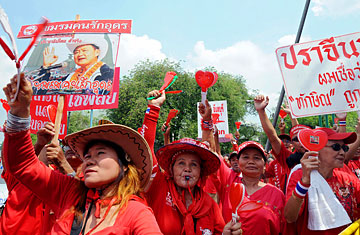
Supporters of Thailand's ousted premier Thaksin Shinawatra shout slogans during a demonstration at Bangkok's Government House on April 7, 2009
Fears of political violence were rife in Thailand on Tuesday one day before an anti-government protest that organizers promised would be massive. The mounting tensions prompted Prime Minister Abhisit Vejjajiva to warn opposition groups during a sternly delivered televised address that his government would take "decisive action" against demonstrators if they incited rioting or broke the law, vowing that the country would not descend into civil war.
The group of protesters, known as the 'red shirts' for the color they take to the streets, are led remotely by former Prime Minister Thaksin Shinawatra, who was ousted in a 2006 bloodless military coup. Subsequently convicted by the Supreme Court on conflict of interest charges over a land deal, Thaksin is now living in self-imposed exile to avoid serving a two-year prison sentence while another Thai court mulls the fate of about $2 billion of his assets seized on suspicion they were gained through corruption. The former leaders whereabouts are currently unknown, but allegations that he is in neighboring Cambodia have contributed to strained relations between the two countries. (See pictures of the August 2008 Thai protests.)
Thaksin has been addressing a group of several thousand red shirts camped outside Government House by videophone almost every evening for the past two weeks, calling for a "revolution" in Thailand. He has spurned talks with Abhisit's government aimed at easing political tensions, and asked for half a million supporters to flood the streets on Wednesday to force the newly appointed prime minister to resign and pave the way for Thaksin's return to power through an amnesty. (Read a TIME Q&A with Thaksin Shinawatra.)
Meanwhile, a group of businessmen who supported the 2006 coup offered a one million baht ($28,000) bounty on Monday to anyone who will capture Thaksin and bring him back to Thailand. Tens of thousands of anti-Thaksin protestors turned out at several provincial capitals on Monday, including Thaksin's hometown of Chiang Mai, to swear allegiance and vow to defend the monarchy. Thaksin has been accused by many of his opponents, including one of the king's advisers, of disloyalty to the monarchy and wanting to establish a republic. He has vigorously denied the accusations.
The words "civil war" have been thrown around by many Thais this week as government members, supporters and others are concerned that red shirt leaders will attempt to provoke a violent response from security forces — or even stage an attack on their own members and make it appear the work of security forces to turn the public against the government. Thaksin has promised this demonstration will be larger than those pivotal years. Red shirt leaders have said they will marshal at least 300,000 protesters, but few analysts expect they will be able to raise more than a third of that — or, more importantly, succeed in toppling the government. "Thaksin wants to provoke violence so that everyone will say it's the fault of the 'evil military' and that he is the 'champion of democracy,'" says Kraisak Choonhavan, a member of the ruling Democrat Party and a former senator. "It's his only hope of bringing down the government.''
To avoid a crisis, the government will have to exercise the utmost caution in dealing with the demonstrators, says Somkiat Pongpaiboon, a Democrat lawmaker and leader of the People's Alliance for Democracy, an anti-Thaksin group which staged months of protests last year, including the seizure of New Bangkok International Airport for eight days. (Last week, that group's leaders reported to police to face charges for their takeover of Government House during that round of protests; they were released on bail.) Abhisit said during his speech that only police, and not the army, will be assigned to keep order at the protests, and that they will not carry guns.
How much energy Thais have for this permanent state of unrest is another question. Last year, the nation's all important tourist sector ground to a halt during the eight-day long protest at New Bangkok International Airport. A recent survey by the Suan Dusit polling agency shows that nearly 70% of Thais want Thaksin to stop inciting unrest and allow the government to work at solving the economic crisis. With the Thai economy set for a potential contraction of up to 4% this year, the Asian Development Bank said earlier this week that political infighting could hamper the effectiveness of the government's $44 billion economic stimulus program. The fate of that program, and the government itself, may rest on events surrounding the protests. And once again, most Thais can do little but watch, and wait.
